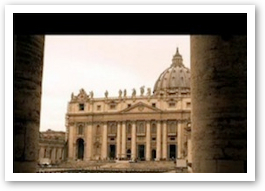Amen to a good offer
- FATHER RAYMOND J. DE SOUZA
The decision announced in Rome yesterday to create structures to allow Anglicans to convert to Catholicism in a corporate way, while retaining many of their Anglican traditions, is a major historical development.
 |
And, as is usually the case with something truly historic in the Catholic Church, it is a retrieval of something centuries old.
Pope Benedict will permit Anglicans who believe what Catholics believe -- many of them call themselves "traditional Anglicans" or "Anglo-Catholics" -- to become Catholics en masse, and that parishes and dioceses will be set up so that they may maintain their own traditions. Parishes and dioceses are usually territorial, meaning that you belong to a certain parish or diocese depending on where you live.
But there are plenty of anomalies in Church practice: bishops appointed to look after military personnel dispersed through a country or around the world; non-territorial dioceses ("prelatures") for groups attached to certain liturgical traditions or norms of life (Opus Dei is one of them); provisions for ethnic groups -- for example, there has long been a bishop in Toronto charged with care of the Hungarian diaspora.
Most significantly, some 400 years ago a breach was healed with the Greek Catholics in the east who had separated from Rome in order to follow Constantinople. Upon their return in 1595, they were permitted to maintain their own liturgical traditions and forms of governance, while affirming total unity of faith and full communion with Rome. Canadians will be most familiar with Ukrainian Catholics, numerous especially in Western Canada, who are fully Catholic while maintaining the Eastern liturgy and practice. Indeed, the Catholic Church includes nearly two dozen "Eastern Rites," all of which have their own distinctive traditions, including married priests (but celibate bishops).
The Vatican had received hundreds of requests from Anglican bishops and priests over the past few years for some structure for integration, and the Apostolic Constitution announced yesterday -- canonical parlance for a legislative papal document -- is the response.
"In this way, the Apostolic Constitution seeks to balance on the one hand the concern to preserve the worthy Anglican liturgical and spiritual patrimony and, on the other hand, the concern that these groups and their clergy will be integrated into the Catholic Church," the Vatican said.
The patrimony! English speaking Catholics for generations have admired the Anglican patrimony, especially in liturgy and sacred music. That this patrimony might soon enrich Catholic worship is news for great rejoicing. In much the same way as the riches of Greek Catholic worship were grafted back on the Catholic vine after the Eastern divisions of the 11th century, so this modest step is the first grafting back onto the vine of those western Christians who were divided in the 16th century.
While Catholics could never countenance the division of the Church wrought by Henry VIII, to say nothing of his brutal persecutions, much that was noble survived in the subsequent development of Anglicanism. Anglicans today are divided about how to adapt that tradition to today's circumstances, and a minority have decided that the only way forward is to go back to full union with the Catholic Church. Pope Benedict's decision is a generous and liberal one, accommodating all novelties which can be accommodated within the profession of the ancient faith.
Pope Benedict's decision is a generous and liberal one, accommodating all novelties which can be accommodated within the profession of the ancient faith. |
The Archbishop of Canterbury, Dr. Rowan Williams, commented yesterday that this was not an "act of aggression" on the part of Catholics, but rather an indication of how much Catholics and Anglicans share in common. It is true that what unites us has always been greater than what divides us, but it is also true that differences make a difference, and at some point one has to decide where one stands. The Anglican Communion has been wrestling with its very identity for some time now, and at least some part of it has decided that becoming Catholic is God's will for them. It behooves the Catholic Church to respect that.
Both Catholic and Anglican bishops were keen yesterday to say that this new papal initiative does not detract from the search for full communion between Catholics and Anglicans as a whole. That remains a shared prayer, but simple prudence means finding other workable measures for unity today, as in fact the two communities are moving farther apart, not closer together, on matters of doctrine. The unity of the Church, Pope Benedict said at his inaugural papal Mass, was his first duty. He has creatively made a significant step forward in discharging that duty.
 This is Meaghen Gonzalez, Editor of CERC. I hope you appreciated this piece. We curate these articles especially for believers like you.
This is Meaghen Gonzalez, Editor of CERC. I hope you appreciated this piece. We curate these articles especially for believers like you.
Please show your appreciation by making a $3 donation. CERC is entirely reader supported.

Acknowledgement
Father Raymond J. de Souza, "Amen to a good offer." National Post, (Canada) October 21, 2009.
Reprinted with permission of the National Post and Fr. de Souza.
The Author
Father Raymond J. de Souza is the founding editor of Convivium magazine.
Copyright © 2009 National Post

